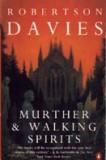 Yesterday I talked a bit about The Cunning Man, the last novel written by Robertson Davies.
Yesterday I talked a bit about The Cunning Man, the last novel written by Robertson Davies. Today I am still thinking about how much I have enjoyed his work, and I’ll say a few things about his prior novel, Murther And Walking Spirits.
Together, these books were to be part 1 and 2 of the next trilogy in the Davies canon.
Murther is a great book, I really enjoyed it. Again, (as with The Cunning Man) it is not my favorite Davies novel, but nonetheless, it is excellent in its own right. It can be read entirely on its own, without reference to The Cunning Man, and vice versa. They are moreso contiguous than continuous. Several of the characters do overlap.
[In case you are curious about it, my favorite Davies novel is World of Wonders.]
“Well why don’t you write about that one then, you Bozo?”
“I probably will cover the Deptford Trilogy as a whole. Dessert. Dessert!”
Who else but R. Davies could kill off his main character in the first sentence, and then chronicle the experiences of the disembodied ghost for over three and a half hundred pages... and yet keep it increasingly interesting? He does it.
Incidentally, Davies believed that physical death would not spell the annihilation of the animating spirit of man (a belief to which I am in full agreement). He once speculated about his own afterlife by saying: "I haven't any notion of what I might be or whether I'll be capable of recognizing what I've been, or perhaps even what I am, but I expect that I shall be something." Murther is a really interesting fictional account of what that "something" might be like.
The moment that Connor Gilmartin is struck dead in his own bedroom by his wife's lover, he finds that he is still alive! Perhaps even more alive than he has ever been; he is in a state that the opening chapter calls "roughly translated".
He's a ghost; a walking spirit.
This new state is fraught with all manner of possibilities and limitations. For one thing, his powers of awareness and observation are heightened, but (alas, downside) he is unable to communicate with any of the living, no matter how he jumps up and down or shouts in their ear. And for that typically Robertsonian twist, the great author borrows an idea from the Bhagavad Gita which states that after death one maintains a connection with what one was thinking about at the very moment of death.
[It behoved a man to be concerned with what he was thinking of as he died!]
So... what was Connor Gilmartin thinking of at the moment of his own death?
Well, he was processing the fact that he had just caught his wife... ummm... horizontally involved with a man (a co-worker of his) whom he particularly despised for many reasons, and secondly, he was thinking of a particular work-related problem concerning an upcoming Film Festival in Toronto to which this man (his murderer) was vying with him for position as lead writer.
[Are you following me? Am I explaining this well enough?]
The guy murders Connor, right there in Connor's own bedroom!
Now Connor is dead, and profoundly aware of his wife's immediate duplicity in covering up the murder but he (Connor) is unable to vindicate himself in any way, and furthermore he is bound inextricably to his own murderer who attends the Film Festval as lead writer in his place.
In a surreal twist, at the Film Festival, what Connor views on the screen is not what the others are seeing, but rather it is a documentary of his own ancestry... (one's life flashes before one's eyes??) He is seeing something wholly personal. It is very much as though he is afforded the opportunity to become posthumously acquainted with his forbears.
After the festival he is instantly translated back to see how his wife is winding up her affairs.
He sees that she has actually found a way to profit from his untimely demise.
Oh it’s good, it really is. I highly recommend the book.
As usual, Davies raises a lot of interesting things to philosophize about, as we enjoy a great sprawling ball of yarn of a story.
It’s not the best example of Davies' work, but still worthy of our attention.
Which is to say that his other stuff, especially The Deptford Trilogy, is essential reading.
Essential!
"We live and learn, yes," Glimartin observes. "But we die and learn, too, it appears."
*********
No comments:
Post a Comment
Thank you for your words!